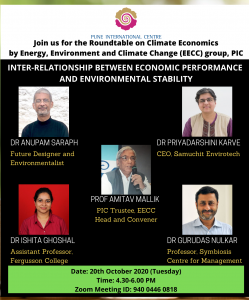
The Energy, Environment and Climate Change (EECC) Climate Economics Round Table on ‘Inter-Relationship between Economic Performance and Environmental Stability’, convened by Prof Amitav Mallik (PIC Trustee, EECC Head), was organized on 20th October.
Prof Amitav Mallik gave the introductory remarks on the importance of Climate Economics and how, thanks to technology and innovations, we can now simultaneously combine Sustained Economic Progress and Reducing Climate Risks. He elaborated on environmental damages in the current system and concluded that the best economic practices for the future will have to be climate resilient, sustainable and equitable; because if it is not done the price to pay is very large.
The round table saw insightful talks by Dr Anupam Saraph (Future Designer and Environmentalist) on Systems Approach, Dr Priyadarshini Karve (Director, Samuchit Envirotech and Convener, INECC) on Renewable Energy Transition, Dr Ishita Ghoshal (Assistant Professor, Fergusson College) on economics of lifestyle changes and Dr Gurudas Nulkar (Professor, Symbiosis Centre for Management and Trustee, Ecological Society) on Ecological Restoration and Climate Change impacts.
Dr Karve spoke about renewable energy transition for all and emphasized that we can go 100% renewable even now with existing technologies in the next few decades. However it is in our hands as citizens to vote for only renewable energy policy for this to happen. Dr Ghoshal discussed energy consumption and said it has negative impacts on GDP growth when it comes to developing in a transition economy as opposed to positive impacts in developed economies. Hence, we need to target over-consumption and ensure utilizing green and renewable energy products.
Dr Nulkar focused on sustainable development and the need to achieve it by improving quality of life, creating equitable material conditions, frugal use of natural resources and minimizing waste generation. Primarily, maintaining earth’s capacity to maintain life. Dr Saraph spoke of the importance of systems-thinking approach while planning economic development because our well-being depends on the environment we live in.
The session was well attended. Prof Mallik and Dr Vijay Kelkar (Vice-President, PIC) gave the concluding and closing remarks.




